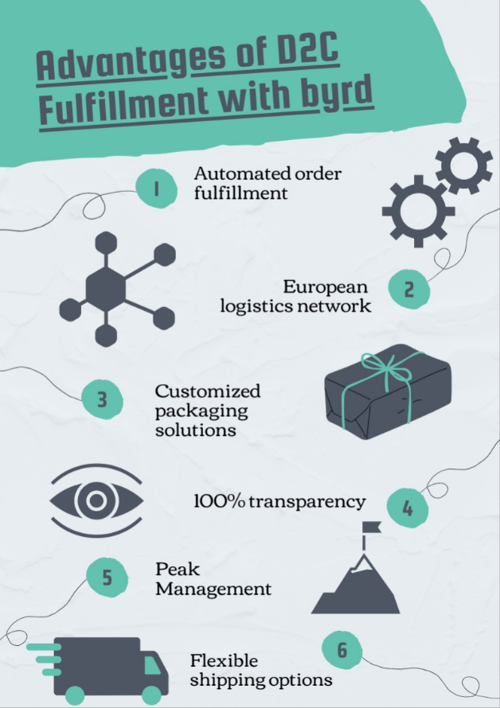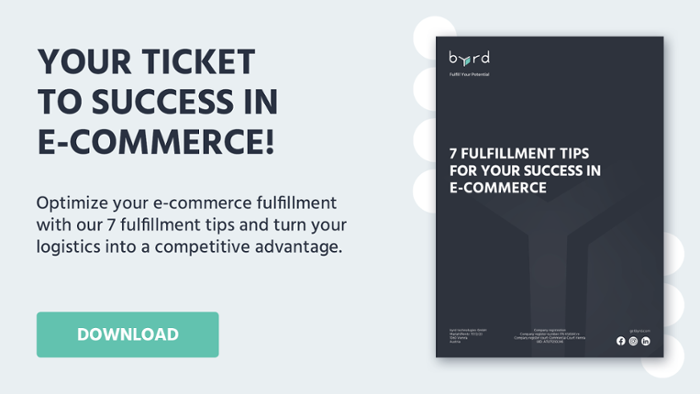Direct-to-consumer Strategy
Table of Content
The direct-to-consumer (D2C) model isn't just a trend anymore - it's a cornerstone of e-commerce strategy in the UK and Europe. It’s driven by the desire for personalized customer experiences and exclusive product offerings. Read on to learn all the basics and how a winning D2C fulfillment setup can make you thrive.
D2C is an online retail sales strategy in which a business markets, sells, and ships products directly to customers without involving intermediaries. This means that there is no middleman to promote or distribute the products, resulting in products that can be offered to consumers at lower prices or with a higher profit margin. In addition, a D2C seller maintains total control over their business operations.
In contrast to most brick-and-mortar sales, direct-to-consumer companies target their potential customers with direct advertising, as well as social media and content marketing. This strategy has huge potential to get their target group’s attention on an individual level - often in the most cost-efficient way possible.
Advertising measures such as Google Ads and marketing activities on social platforms like Instagram, TikTok, LinkedIn, Facebook, or YouTube can increase sales through impulse purchases and direct sales. Another way to maximize profits for D2C companies is through social media partnerships.
In addition, customers can often be won through other types of content marketing. For example, a successful blog or an SEO-optimized website is often worth its weight in gold to win new customers and turn existing buyers into loyal shoppers.
All these strategies share the commonality of enabling e-commerce brands to maintain direct contact with their target customers/audience. This direct communication often results in several advantages beyond just reduced costs. Customers who engage directly with companies tend to exhibit greater loyalty, purchase more frequently and in higher quantities, show less sensitivity to pricing, and are more likely to recommend products and brands to others
In addition, one of the most important factors of direct communication with customers is the valuable feedback they provide. Understanding what customers appreciate and, even more importantly, what they don’t like can often be more beneficial than a single sale. This insight allows D2C e-commerce companies to save resources in market research while staying attuned to their customers' preferences and wishes
This video, which has more than 28 million views to date, and similar efforts, have helped the company to challenge industry giants such as Gillette, and gain enormous publicity. The simple business model then enabled customers to be won quickly and easily. Subsequently, the products could be sold without a middleman, and thus at a low price. This ultimately resulted in Unilever buying the company for $1 billion in 2016.
All D2C (Direct-to-Consumer) activities fall under the broader umbrella of B2C (Business-to-Consumer) commerce. However, not all B2C companies employ a D2C strategy. While B2C encompasses any business that sells directly to consumers, D2C specifically refers to brands that bypass traditional retail channels to engage directly with their customers. This distinction allows D2C brands to maintain greater control over their messaging, customer experience, and product distribution.
Sounds complicated, but it’s not. After all, any company that sells products to end customers, with or without a middleman, is a B2C company. If this is done directly and without intermediaries, the company is also considered a D2C company by definition.
E-commerce platforms are also considered intermediaries (middlemen) in the sales process. For example, if an online retailer sells its product through Amazon, this is not considered a D2C business. Amazon and Co. on the other hand justify the accruing duties by the increased visibility and the increased traffic.

By the way, if sales are made in large quantities to other companies, this is called B2B (business-to-business) trade.
The popularity of D2C brands has figuratively exploded in recent years, it has quickly become apparent that self-operated warehouses and in-house order fulfillment are holding back the growth of direct-to-consumer companies.
The simplest solution for fast-growing online retailers is working with so-called 3PL partners. By outsourcing and automating order fulfillment, bottlenecks can be prevented. At the same time, specialized and optimized processes reduce or eliminate errors and guarantee efficient operations.
Moreover, having optimized fulfillment will also render cost-effective shipping and a top-notch customer experience that can go toe-to-toe with industry giants like Amazon and Co. However, D2C brands can retain their individuality when working with fulfillment service providers like byrd. For example, individually branded packaging can be used as a differentiator from competitors.
In addition to the benefits mentioned above, such as fast and cost-effective delivery and branded packaging, byrd’s strong European fulfillment network is one factor that has been simplifying the business lives of many D2C brands. Several locations across Europe’s largest e-commerce markets - such as Germany, Spain, Italy, France, the UK, the Netherlands, and Austria - allow decentralized warehousing. Facilitating cross-border fulfillment and shipping while ensuring closer geographical proximity to your end customers.
byrd’s all-in-one fulfillment tool integrates your shop seamlessly with all leading e-commerce systems such as Shopify, WooCommerce, Amazon, Plentymarkets, Shopware, and others. This integration process takes just a few minutes and guarantees a smooth and well-organized live data transfer.
Furthermore, you also benefit from shipping flexibility due to years of close cooperation with our international shipping service partner network. This is, as has been shown especially in times of crisis, of crucial importance for B2C as well as D2C companies.
The Advantages of byrd's D2C Fulfillment Summarized:
- Automated order fulfillment
- E-commerce system integration within a few minutes
- Scalability
- International fulfillment network simplifies market entry in new countries without high risks
- Customized packaging solutions
- Benefit from optimized logistics while retaining the ability to customize and brand your packaging. This differentiates you from Amazon’s generic boxes and allows you to offer a great unboxing experience.
- Transparency
- Live tracking of inventory, sales, returns, and many other reports helps you stay on top of things
- Peak management
- With flexible fulfillment solutions, seasonal peaks, and order spikes due to influencer campaigns and similar, successful marketing campaigns won’t lead to operational bottlenecks anymore.
- Flexible shipping options
- Whether climate-neutral shipping, express or standard shipping, we offer maximum flexibility through our close cooperation with all leading parcel service providers.

In addition to the DollarShaveClub company mentioned above, there are hundreds of other online companies that have celebrated incredible success with a D2C business model and are still putting up impressive numbers.
Casper Mattresses
Another company that is considered a prime example in this regard is Casper Mattresses. By selling mattresses in a direct-to-consumer way, $100 million in revenue was generated in just 2 years. How is this possible?
Casper quickly realized that there was a big, even too big, selection of mattresses available that were not all that different from each other. Every one of us has had this experience – if there is too much choice, a decision is postponed or a purchase is generally not made. In marketing psychology, this is known as the “choice overload” effect.
So what did Casper do? Exactly, they offered only one mattress. So instead of creating the optimal mattresses for back sleepers, side sleepers, and so on, they simply worked on one single mattress, “the best mattress.”
The sales figures speak for themselves. So do, by the way, the more than 20,000 reviews on Google with an average of 4.4 stars (after 3 minutes of scrolling, we still couldn’t find a review that was less than the maximum of 5 stars).
D2C is an unstoppable force in online commerce that will shape the e-commerce landscape in the future. This business model has already propelled numerous companies to status which refers to businesses valued at over $1 billion. D2C commerce offers significant advantages for e-commerce companies, including closer customer relationships, enhanced control over operations, and lower costs.
As the D2C trend continues to grow, the importance of effective order fulfillment and logistics becomes increasingly critical. Third-party logistics (3PL) providers and fulfillment partners, such as Byrd, have emerged as appealing solutions for many e-commerce businesses. These partnerships streamline business processes, improve operational efficiency, and enhance the customer experience through faster delivery. Therefore, for those operating in the D2C space, collaborating with a fulfillment company can be a strategic advantage.
